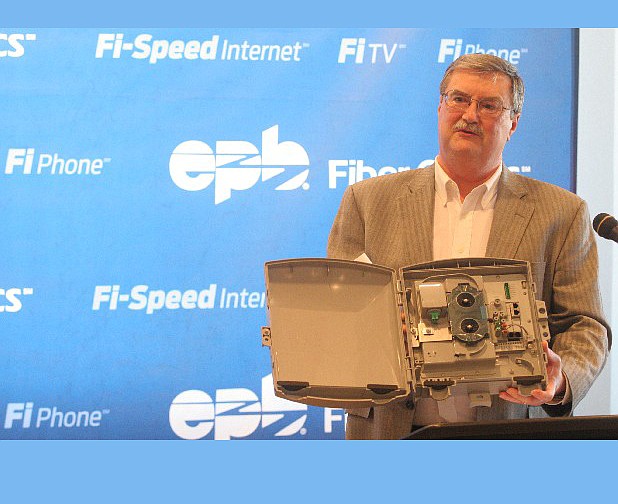EPB officials on Tuesday delivered a spirited defense of the utility's Smart Grid and fiber optics system at a City Council briefing, painting the digital legacy of EPB chief Harold DePriest as a world-leading system that has already delivered millions of dollars in benefits to the utility's 170,000 customers.
The fiber optic system, which cost hundreds of millions of dollars in electric system bonds and federal grants, has drawn fire from a handful of opponents who say it's a pricey program that has put the city-owned utility in competition with private companies like Comcast and AT&T.
But the president and CEO of EPB said the benefits -- which include drastic reductions in storm outages, millions of dollars in savings from automation, and ratepayer savings on the electric side of the business -- offer tangible benefits available in no other U.S. city. While the ultra-fast broadband speeds that have made Chattanooga the "Gig City" are advantageous, there's much more to the fiber system than faster Netflix videos.
The real stars of EPB's network are the 1,200 Intellirupters that, within seconds, can restore power to entire swaths of the city in seconds, without human intervention, he said. A recent outage that would have resulted in more than 11,000 customers losing power was restored in just over six minutes, instead of the six hours it would have taken previously.
"For EPB's system, on average, we used to lose about $100 million in productivity and business per year from outages, and we have a good system," DePriest said. "What we're seeing today is about a 50 percent improvement in customer minutes off from the Smart Grid. So we're seeing a savings for our businesses and industry of $55 million to $60 million per year."
In technical terms, the average number of outages has fallen to about two outages every three years, with each outage lasting an average of 65 minutes, down from about 1.4 times per year for an average of an hour and 40 minutes before the Smart Grid, DePriest said.
"It'll get better, because frankly, the last few years we've had really crappy weather," he said.
DePriest said the utility passed 50,000 fiber TV, phone and Internet subscribers this month, which he estimates is fully half of the Chattanooga market. The fact that the utility has picked up so many customers so quickly is a good indication that EPB is offering a service that people want, he said.
Though the residential Internet and TV business is operated separately from the electric business, there's no doubt that the additional stream of revenue is turning into a significant source of cash for the utility, DePriest said. The fiber business will bring in $93.6 million in revenue in 2014, of which just under $20 million goes to pay the electric system in "rent" for using the fiber optic cables, DePriest said.
"We would be losing $11.7 million this year without the fiber system, it is that intertwined," DePriest said.
Joe Ferguson, chairman of EPB, said the secret to EPB's success has been running the organization with the efficiency of a private business, but the soul of a nonprofit. Though there's still plenty of debt to pay down for the grid, the fact that it's been profitable almost from the beginning is a good sign for the city-owned utility.
"Right now, the revenue we're seeing from the fiber optic operation is coming right back into the overall organization, and it's going to be a significant part of helping us to hold our rates down," Ferguson said. "We're finding out every week new ways to use this Smart Grid system, and what's going to happen in the future is going to be very interesting."
Contact staff writer Ellis Smith at esmith@timesfreepress.com, or 423-757-6315.

